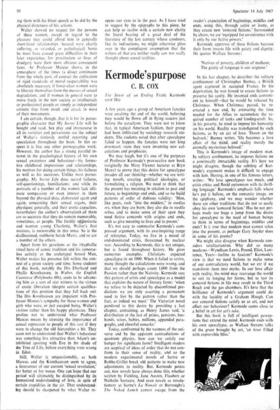Kermode'spurpose
C. B. COX A few years ago a group of American fanatics were awaiting the end of the world, believing they would be flown off in flying saucers just before the cataclysm. They were not to know that, in typical American fashion, their group had been infiltrated by sociology research stu- dents. The students noted that after apocalypse failed to happen, the fanatics were not long downcast; soon they were inventing new cal- culations and prophecies.
We may laugh, but it's one of the purposes of Professor Kermode's provocative new book (originally the Mary Flexner lectures at Bryn Mawr) to prove that this desire for apocalypse invades all our thinking—whether we are writ- ing novels, creating political ideologies, or formulating a religion. We need to think that the present has meaning in relation to past and future, to beginnings and ends, and so we build patterns of order of dubious validity: 'Men, like poets, rush "into the middest," in medias res, when they are born; they also die in mediis rebus, and to make sense of their span they need fictive concords with origins and ends, such as give meaning to lives and to poems.'
It's not easy to summarise Kermode's com- pressed argument, with its awe-inspiring range of reference. Today, we live in a mood of end-dominated crisis, threatened by nuclear war. According to Kermode, this is not unique, but is found throughout history. He gives numerous examples. Christians expected apocalypse in AD 1000. When it failed to arrive, many thought the calculations were wrong, and that we should perhaps count 1,000 from the Passion rather than the Nativity.. Kermode sees this pattern of crisis and apocalypse as a model that explains the nature of literary form: 'when we refuse to be dejected by disconfirmed pre- dictions we are only asserting a permanent need to live by the pattern rather than the fact, as indeed we must.' The Victorian novel pandered to this desire by providing a last chapter, containing, as Henry James said, 'a distribution at the last of prizes, pensions, hus- bands, wives, babies, millions, appended para- graphs, and cheerful remarks.'
Today, confronted by the vastness of the uni- verse and by the apparent contradictions of quantum physics, how can we satisfy our hunger for significant form? Intelligent readers are sceptical of ideas of order that do not con- form to their sense of reality, and so the modern experimental novels of Sartre or Robbe-Grillet break old patterns to make new adjustments to reality. But, Kermode points out, new novels have always done this, whether written by Fielding, Jane Austen, Flaubert or Nathalie Sarraute. And even novels as revolu- tionary as Sartre's La Maisie or Burroughs's The Naked Lunch cannot escape from the reader's expectation of beginnings, middles and ends, using this, through satire or irony, as they create new 'concord fictions.' Surrounded by chaos, we are 'equipped for co-existence with it only by our fictive powers.'
Kermode approves of these fictions because their form invests life with gaiety and dignity. He quotes Wallace Stevens: 'Natives of poverty, children of malheur, The gaiety of language is our seigneur.'
In his last chapter, he describes the solitary confinement of Christopher Burney, a British agent captured in occupied France. In his deprivation,-he was forced to create fictions to preserve his sanity. He invented ends conveni- ent to himself—that he would be released by Christmas. When Christmas passed, he re- created a new end, by estimating the time needed for the Allies to accumulate the re- quired number of tanks and landing-craft. So, in his poverty, he tried to impose his humanity on his world. Reality was transfigured by such fictions, as by an act of love. 'Down on the bedrock,' Burney writes, 'life becomes a love affair of the 'mind, and reality merely the eternally mysterious beloved.'
This is Kermode's image of modern man. In solitary confinement, he imposes fictions on a continually intractable reality. It's here we might disagree, though the subtlety of Ker- mode's argument makes it difficult to engage with him. Herzog, in one of his famous letters, writes : 'We love apocalypses too much, and crisis ethics and florid extremism with its-thrill- ing language.' Kermode's emphasis falls where he's put it before, on the romantic image, on the epiphany, and we may wonder whether there are other traditions that do not so easily obey his own 'concord fiction.' Has he not per- haps made too huge a jump from the desire for apocalypse to the need of human beings to think in terms of beginnings, middles and ends? Is it true that modern man cannot relax into the present, as perhaps Gary Snyder does in some of his poems?
We might also disagree when Kermode con- siders totalitarianism. Why did so many moderns—Wyndham Lewis, Pound, Eliot, Law- rence, Yeats—incline to fascism? Kermode's view is that we need fictions to make sense of our contradictory world, but we err if we transform them into myths. In our love affair with reality, the mind may rearrange the world to suit its longing for forms, but to test its concord fictions in life may result in the Third Reich and the gas chambers. It's here that the brilliance of Kermode's argument could do with the lucidity of a Graham Hough._ Can our concord fictions satisfy us as art, and not affect our behaviour? Kermode seems close to a belief in art for art's sake.
But this book is full of intelligent percep- tions that extend the mind. Kermode ends with his own apocalypse, as Wallace Stevens talks of the grace brought by art, 'an hour Filled with expressible bliss.'






























 Previous page
Previous page